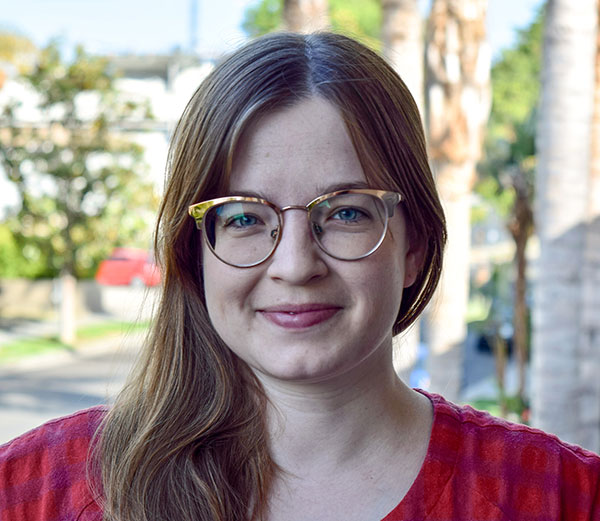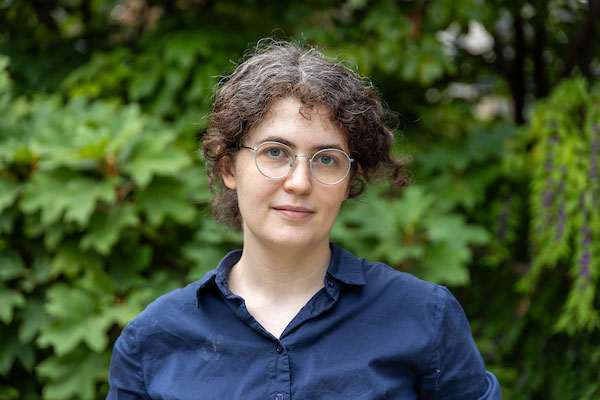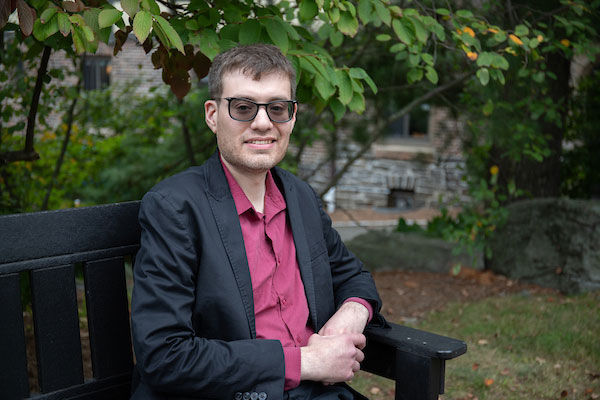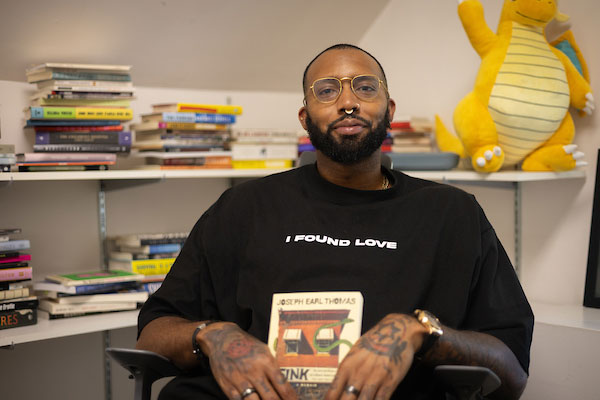The fall semester means new students — and new faculty! Sarah Lawrence is happy to welcome four tenure-track faculty to campus.
Julia Clark (Japanese)
 Coincidences guided Julia Clark to study Japanese. She always enjoyed languages, and had been studying Spanish when she matriculated to a language-focused magnet high school. “I was watching Kurosawa movies with my father, and found myself drawn to the language.” She focused on linguistics at Carleton College, studied abroad in Kyoto, and began shifting to literature and culture studies in graduate school. “The through line in all my work has been the Japanese language.”
Coincidences guided Julia Clark to study Japanese. She always enjoyed languages, and had been studying Spanish when she matriculated to a language-focused magnet high school. “I was watching Kurosawa movies with my father, and found myself drawn to the language.” She focused on linguistics at Carleton College, studied abroad in Kyoto, and began shifting to literature and culture studies in graduate school. “The through line in all my work has been the Japanese language.”
Clark teaches language and literature courses at Sarah Lawrence. Both are forums to exchange ideas, ask questions, and make mistakes. “Students come into my classroom with a wide variety of previous exposure to Japanese language and cultural objects. I encourage them to not worry about being perfect. I want them to think about media as something we’re in conversation with.”
The conference system, close relationships with students, and the freedom to teach her own research and explore students’ interests all resonate with Clark. She is currently researching how minority authors are represented in urban spaces, looking at literature coming out of a Koreatown in Osaka. “I'm thinking more broadly about space and ethnicity, and how urban spaces get inscribed with different ideas of personhood.” The College’s proximity to New York City may be beneficial for her work as well as her classes.“I feel very lucky to be here,” she says. “It’s inspiring to be in a place where thinking critically about literature happens.”
Sarah Racz (Physics)
 A native New Yorker, Racz grew up visiting the nearby Museum of Natural History. She decided to be an astrophysicist, in part because she loved the word. “I collected words as a kid.” She traveled to Oregon to attend Reed College and a burgeoning interest in gravity shifted her studies to theoretical physics. She began teaching as an undergrad and continued through graduate school. “I love showing people that they are already good at physics.” Her time teaching University of Texas football players taught her that athletes are often the best physics students: “it’s all about making connections with the physical world and mapping our intuition to equations.”
A native New Yorker, Racz grew up visiting the nearby Museum of Natural History. She decided to be an astrophysicist, in part because she loved the word. “I collected words as a kid.” She traveled to Oregon to attend Reed College and a burgeoning interest in gravity shifted her studies to theoretical physics. She began teaching as an undergrad and continued through graduate school. “I love showing people that they are already good at physics.” Her time teaching University of Texas football players taught her that athletes are often the best physics students: “it’s all about making connections with the physical world and mapping our intuition to equations.”
In her lecture and seminar classes, Racz can be found climbing chairs and throwing objects to reiterate principles and demonstrate that studying physics need not be serious. “I try to be a little silly in class to show my students that physics isn’t some remote, boring subject.” Her current seminar on relativity began with investigations into its history, the important theorists, and a discussion of how we talk about space/time. This is her favorite type of work. “I’m looking forward to continuing my current research on quantum gravity and quantum chaotic dynamics. And using this research to inform new Sarah Lawrence courses.”
Joel Swanson (Religion)
 For Joel Swanson, teaching at Sarah Lawrence feels like a homecoming. He grew up in the New York metropolitan area and attended Swarthmore as an undergraduate. A faculty member there saw Swanson’s interests in Jewish studies and suggested a PhD program in the field. This sent him to the University of Chicago for graduate school. ”Studying Jewish history is a good test case of what it means to be a minority, to live in a cultural diaspora, and to have an identity unrelated to race and nationality. It brings up questions about the reach of citizenship and nationhood.”
For Joel Swanson, teaching at Sarah Lawrence feels like a homecoming. He grew up in the New York metropolitan area and attended Swarthmore as an undergraduate. A faculty member there saw Swanson’s interests in Jewish studies and suggested a PhD program in the field. This sent him to the University of Chicago for graduate school. ”Studying Jewish history is a good test case of what it means to be a minority, to live in a cultural diaspora, and to have an identity unrelated to race and nationality. It brings up questions about the reach of citizenship and nationhood.”
Swanson aims for his classroom to be a space where students can be comfortable asking whatever questions come to mind. “Their concerns are the most important element.” He encourages students to bring their whole selves to the classroom and to take things in different directions. He hopes to be a conduit by which students can connect to Jewish studies resources in New York City.
It is a pivotal time in the field, and Swanson is adapting his dissertation on francophone Jewish writers and philosophers in the prewar period to speak to the current scholarly conversation. “I’m exploring how my way may speak to the current conflict. How my field could provide a path forward.”
Joseph Earl Thomas (Writing)
 Joseph Thomas was also drawn to Sarah Lawrence because of the community. “Elias Rodrigues (Literature) is a friend and he spoke highly of the school.” Thomas, like the other new faculty members, attended a small liberal arts college and found the experience transformative. “Schools like Sarah Lawrence allow students and faculty to forgo the script of being at college, and get down to the business of truly connecting and learning.”
Joseph Thomas was also drawn to Sarah Lawrence because of the community. “Elias Rodrigues (Literature) is a friend and he spoke highly of the school.” Thomas, like the other new faculty members, attended a small liberal arts college and found the experience transformative. “Schools like Sarah Lawrence allow students and faculty to forgo the script of being at college, and get down to the business of truly connecting and learning.”
Like many writers, Thomas did not start out studying writing. With no artists in his family, he channeled his efforts to support himself. He was an Army medic, then studied biology as an undergraduate at Arcadia University. While working to become a physician's assistant, he began taking writing classes at night. A friend encouraged him to continue writing and look into MFA programs.
Thomas heeded this advice, receiving his MFA from Notre Dame and his PhD from the University of Pennsylvania. His book, Sink, A Memoir was the winner of the Chautauqua Janus Prize. He recently published his first novel, God Bless You, Otis Spunkmeyer, and his short story collection Leviathan Beach is forthcoming.
“I want students to focus on the page. Make every word count.” Thomas is sincere in his love and respect for language, and his classroom can be a highly playful space. “I joke around. I try to show students that how you speak and how you write are connected.” Play is serious business in writing, as it is in all art. That commitment is evident in the classes Thomas teaches, one titled “The Fantasy of Reality,” and another called “Game Life”.